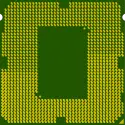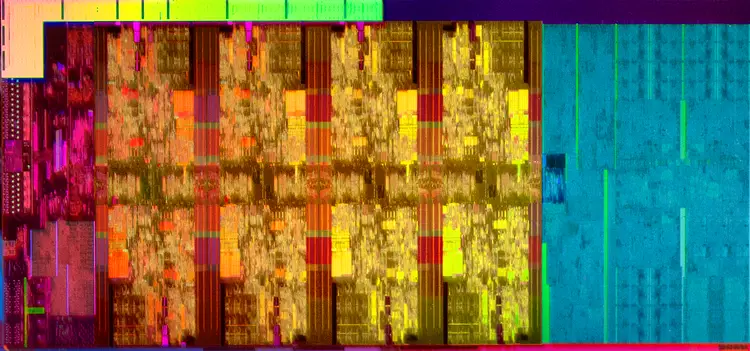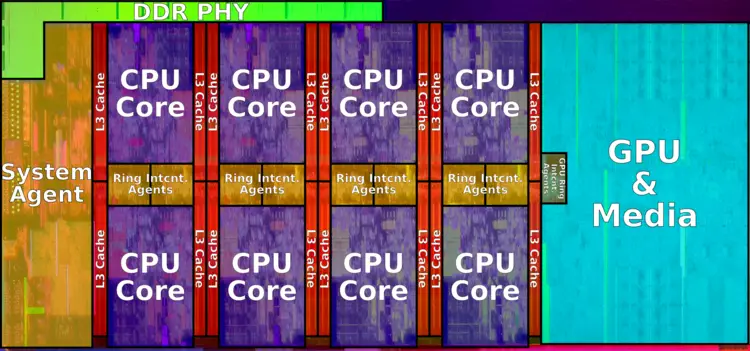From WikiChip
Difference between revisions of "intel/core i7/i7-9700k"
(→Cache) |
|||
| (62 intermediate revisions by 30 users not shown) | |||
| Line 1: | Line 1: | ||
{{intel title|Core i7-9700K}} | {{intel title|Core i7-9700K}} | ||
{{chip | {{chip | ||
| − | |||
|name=Core i7-9700K | |name=Core i7-9700K | ||
|image=coffee lake s (front).png | |image=coffee lake s (front).png | ||
| Line 7: | Line 6: | ||
|manufacturer=Intel | |manufacturer=Intel | ||
|model number=i7-9700K | |model number=i7-9700K | ||
| + | |part number=BX80684I79700K | ||
| + | |part number 2=BXC80684I79700K | ||
| + | |part number 3=CM8068403874212 | ||
| + | |s-spec=SRELT | ||
| + | |s-spec 2=SRG15 | ||
| + | |s-spec qs=QQPK | ||
|market=Desktop | |market=Desktop | ||
| + | |first announced=October 8, 2018 | ||
| + | |first launched=October 19, 2018 | ||
| + | |release price (tray)=$374.00 | ||
| + | |release price (box)=$385.00 | ||
|family=Core i7 | |family=Core i7 | ||
|series=i7-9000 | |series=i7-9000 | ||
|locked=No | |locked=No | ||
| + | |frequency=3,600 MHz | ||
| + | |turbo frequency1=4,900 MHz | ||
|bus type=DMI 3.0 | |bus type=DMI 3.0 | ||
|bus links=4 | |bus links=4 | ||
|bus rate=8 GT/s | |bus rate=8 GT/s | ||
| + | |clock multiplier=36 | ||
|isa=x86-64 | |isa=x86-64 | ||
|isa family=x86 | |isa family=x86 | ||
| Line 22: | Line 34: | ||
|core family=6 | |core family=6 | ||
|core model=158 | |core model=158 | ||
| + | |core stepping=P0 | ||
|process=14 nm | |process=14 nm | ||
|technology=CMOS | |technology=CMOS | ||
|word size=64 bit | |word size=64 bit | ||
| − | |core count= | + | |core count=8 |
| − | |thread count= | + | |thread count=8 |
| + | |max memory=128 GiB | ||
|max cpus=1 | |max cpus=1 | ||
| − | |||
|tdp=95 W | |tdp=95 W | ||
| + | |tjunc min=0 °C | ||
| + | |tjunc max=100 °C | ||
|tstorage min=-25 °C | |tstorage min=-25 °C | ||
|tstorage max=125 °C | |tstorage max=125 °C | ||
|package module 1={{packages/intel/fclga-1151}} | |package module 1={{packages/intel/fclga-1151}} | ||
}} | }} | ||
| − | '''Core i7-9700K''' is a {{arch|64}} [[ | + | '''Core i7-9700K''' is a {{arch|64}} [[octa-core]] high-end performance [[x86]] desktop microprocessor introduced by [[Intel]] in late [[2018]]. This processor, which is based on the {{intel|Coffee Lake|l=arch}} microarchitecture, is manufactured on Intel's 3rd generation enhanced [[14 nm process|14nm++ process]]. The i7-9700K operates at a 3.6 GHz with a [[TDP]] of 95 W and a {{intel|Turbo Boost}} frequency of up to 4.9 GHz. This chip supports up to 128 GiB of dual-channel DDR4-2666 memory and incorporates Intel's {{intel|UHD Graphics 630}} IGP operating at 350 MHz with a burst frequency of 1.2 GHz. |
| − | |||
| − | |||
| − | |||
| − | |||
| − | |||
| − | |||
| − | |||
== Cache == | == Cache == | ||
{{main|intel/microarchitectures/coffee_lake#Memory_Hierarchy|l1=Coffee Lake § Cache}} | {{main|intel/microarchitectures/coffee_lake#Memory_Hierarchy|l1=Coffee Lake § Cache}} | ||
{{cache size | {{cache size | ||
| − | |l1 cache= | + | |l1 cache=512 KiB |
| − | |l1i cache= | + | |l1i cache=256 KiB |
| − | |l1i break= | + | |l1i break=8x32 KiB |
|l1i desc=8-way set associative | |l1i desc=8-way set associative | ||
| − | |l1d cache= | + | |l1d cache=256 KiB |
| − | |l1d break= | + | |l1d break=8x32 KiB |
|l1d desc=8-way set associative | |l1d desc=8-way set associative | ||
|l1d policy=write-back | |l1d policy=write-back | ||
| − | |l2 cache= | + | |l2 cache=2 MiB |
| − | |l2 break= | + | |l2 break=8x256 KiB |
|l2 desc=4-way set associative | |l2 desc=4-way set associative | ||
|l2 policy=write-back | |l2 policy=write-back | ||
|l3 cache=12 MiB | |l3 cache=12 MiB | ||
| − | |l3 break= | + | |l3 break=8x1.5 MiB |
| − | |l3 desc= | + | |l3 desc=12-way set associative |
|l3 policy=write-back | |l3 policy=write-back | ||
}} | }} | ||
| Line 66: | Line 74: | ||
== Memory controller == | == Memory controller == | ||
{{memory controller | {{memory controller | ||
| − | |type=DDR4- | + | |type=DDR4-3000 |
|ecc=No | |ecc=No | ||
| − | |max mem= | + | |max mem=128 GiB |
|controllers=1 | |controllers=1 | ||
|channels=2 | |channels=2 | ||
|max bandwidth=39.74 GiB/s | |max bandwidth=39.74 GiB/s | ||
| + | |frequency=3000 | ||
|bandwidth schan=19.87 GiB/s | |bandwidth schan=19.87 GiB/s | ||
|bandwidth dchan=39.74 GiB/s | |bandwidth dchan=39.74 GiB/s | ||
| Line 96: | Line 105: | ||
| execution units = 24 | | execution units = 24 | ||
| max displays = 3 | | max displays = 3 | ||
| − | | max memory = | + | | max memory = 128 GiB |
| frequency = 350 MHz | | frequency = 350 MHz | ||
| max frequency = 1,200 MHz | | max frequency = 1,200 MHz | ||
| Line 154: | Line 163: | ||
|sse42=Yes | |sse42=Yes | ||
|sse4a=No | |sse4a=No | ||
| + | |sse_gfni=No | ||
|avx=Yes | |avx=Yes | ||
| + | |avx_gfni=No | ||
|avx2=Yes | |avx2=Yes | ||
|avx512f=No | |avx512f=No | ||
| Line 166: | Line 177: | ||
|avx512vbmi=No | |avx512vbmi=No | ||
|avx5124fmaps=No | |avx5124fmaps=No | ||
| + | |avx512vnni=No | ||
|avx5124vnniw=No | |avx5124vnniw=No | ||
|avx512vpopcntdq=No | |avx512vpopcntdq=No | ||
| + | |avx512gfni=No | ||
| + | |avx512vaes=No | ||
| + | |avx512vbmi2=No | ||
| + | |avx512bitalg=No | ||
| + | |avx512vpclmulqdq=No | ||
|abm=Yes | |abm=Yes | ||
|tbm=No | |tbm=No | ||
| Line 181: | Line 198: | ||
|clmul=Yes | |clmul=Yes | ||
|f16c=Yes | |f16c=Yes | ||
| + | |bfloat16=No | ||
|tbt1=No | |tbt1=No | ||
|tbt2=Yes | |tbt2=Yes | ||
|tbmt3=No | |tbmt3=No | ||
| + | |tvb=No | ||
|bpt=No | |bpt=No | ||
|eist=Yes | |eist=Yes | ||
| Line 204: | Line 223: | ||
|tsx=Yes | |tsx=Yes | ||
|txt=Yes | |txt=Yes | ||
| − | |ht= | + | |ht=No |
|vpro=Yes | |vpro=Yes | ||
|vtx=Yes | |vtx=Yes | ||
| Line 214: | Line 233: | ||
|osguard=Yes | |osguard=Yes | ||
|intqat=No | |intqat=No | ||
| + | |dlboost=No | ||
|3dnow=No | |3dnow=No | ||
|e3dnow=No | |e3dnow=No | ||
| Line 233: | Line 253: | ||
|amdpbod=No | |amdpbod=No | ||
}} | }} | ||
| + | |||
| + | == Frequencies == | ||
| + | {{see also|intel/frequency_behavior|l1=Intel's CPU Frequency Behavior}} | ||
| + | {{frequency table | ||
| + | |freq_base=3,600 MHz | ||
| + | |freq_1=4,900 Mhz | ||
| + | |freq_2=4,800 Mhz | ||
| + | |freq_3=4,700 Mhz | ||
| + | |freq_4=4,700 Mhz | ||
| + | |freq_5=4,600 Mhz | ||
| + | |freq_6=4,600 Mhz | ||
| + | |freq_7=4,600 Mhz | ||
| + | |freq_8=4,600 Mhz | ||
| + | }} | ||
| + | |||
| + | == Die == | ||
| + | {{see also|intel/microarchitectures/coffee_lake#Die|l1=Coffee Lake § Die}} | ||
| + | A die shot of Intel's Coffee Lake [[octa-core]] desktop processors: | ||
| + | |||
| + | : [[File:coffee lake die (octa core).png|750px]] | ||
| + | |||
| + | |||
| + | : [[File:coffee lake die (octa core) (annotated).png|750px]] | ||
| + | |||
| + | == Documents == | ||
| + | * [[:File:9th-gen-core-desktop-brief.pdf|Product Brief]] | ||
Latest revision as of 15:31, 7 August 2023
| Edit Values | ||||||||||||
| Core i7-9700K | ||||||||||||
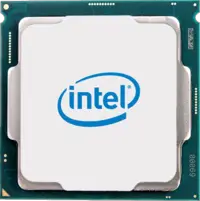 | ||||||||||||
| General Info | ||||||||||||
| Designer | Intel | |||||||||||
| Manufacturer | Intel | |||||||||||
| Model Number | i7-9700K | |||||||||||
| Part Number | BX80684I79700K, BXC80684I79700K, CM8068403874212 | |||||||||||
| S-Spec | SRELT, SRG15 QQPK (QS) | |||||||||||
| Market | Desktop | |||||||||||
| Introduction | October 8, 2018 (announced) October 19, 2018 (launched) | |||||||||||
| Release Price | $374.00 (tray) $385.00 (box) | |||||||||||
| Shop | Amazon | |||||||||||
| General Specs | ||||||||||||
| Family | Core i7 | |||||||||||
| Series | i7-9000 | |||||||||||
| Locked | No | |||||||||||
| Frequency | 3,600 MHz | |||||||||||
| Turbo Frequency | 4,900 MHz (1 core) | |||||||||||
| Bus type | DMI 3.0 | |||||||||||
| Bus rate | 4 × 8 GT/s | |||||||||||
| Clock multiplier | 36 | |||||||||||
| Microarchitecture | ||||||||||||
| ISA | x86-64 (x86) | |||||||||||
| Microarchitecture | Coffee Lake | |||||||||||
| Platform | Coffee Lake | |||||||||||
| Chipset | 300 series | |||||||||||
| Core Name | Coffee Lake R | |||||||||||
| Core Family | 6 | |||||||||||
| Core Model | 158 | |||||||||||
| Core Stepping | P0 | |||||||||||
| Process | 14 nm | |||||||||||
| Technology | CMOS | |||||||||||
| Word Size | 64 bit | |||||||||||
| Cores | 8 | |||||||||||
| Threads | 8 | |||||||||||
| Max Memory | 128 GiB | |||||||||||
| Multiprocessing | ||||||||||||
| Max SMP | 1-Way (Uniprocessor) | |||||||||||
| Electrical | ||||||||||||
| TDP | 95 W | |||||||||||
| Tjunction | 0 °C – 100 °C | |||||||||||
| Tstorage | -25 °C – 125 °C | |||||||||||
| Packaging | ||||||||||||
| ||||||||||||
Core i7-9700K is a 64-bit octa-core high-end performance x86 desktop microprocessor introduced by Intel in late 2018. This processor, which is based on the Coffee Lake microarchitecture, is manufactured on Intel's 3rd generation enhanced 14nm++ process. The i7-9700K operates at a 3.6 GHz with a TDP of 95 W and a Turbo Boost frequency of up to 4.9 GHz. This chip supports up to 128 GiB of dual-channel DDR4-2666 memory and incorporates Intel's UHD Graphics 630 IGP operating at 350 MHz with a burst frequency of 1.2 GHz.
Contents
Cache[edit]
- Main article: Coffee Lake § Cache
|
Cache Organization
Cache is a hardware component containing a relatively small and extremely fast memory designed to speed up the performance of a CPU by preparing ahead of time the data it needs to read from a relatively slower medium such as main memory. The organization and amount of cache can have a large impact on the performance, power consumption, die size, and consequently cost of the IC. Cache is specified by its size, number of sets, associativity, block size, sub-block size, and fetch and write-back policies. Note: All units are in kibibytes and mebibytes. |
|||||||||||||||||||||||||||||||||||||
|
|||||||||||||||||||||||||||||||||||||
Memory controller[edit]
|
Integrated Memory Controller
|
||||||||||||||||
|
||||||||||||||||
Expansions[edit]
Expansion Options |
|||||
|
|||||
Graphics[edit]
|
Integrated Graphics Information
|
||||||||||||||||||||||||||||||||||||||||||||||||||||||||||||||||||||
|
||||||||||||||||||||||||||||||||||||||||||||||||||||||||||||||||||||
| [Edit] Coffee Lake (Gen9.5) Hardware Accelerated Video Capabilities | |||||||
|---|---|---|---|---|---|---|---|
| Codec | Encode | Decode | |||||
| Profiles | Levels | Max Resolution | Profiles | Levels | Max Resolution | ||
| MPEG-2 (H.262) | Main | High | 1080p (FHD) | Main | Main, High | 1080p (FHD) | |
| MPEG-4 AVC (H.264) | High, Main | 5.1 | 2160p (4K) | Main, High, MVC, Stereo | 5.1 | 2160p (4K) | |
| JPEG/MJPEG | Baseline | - | 16k x 16k | Baseline | Unified | 16k x 16k | |
| HEVC (H.265) | Main | 5.1 | 2160p (4K) | Main, Main 10 | 5.1 | 2160p (4K) | |
| VC-1 | ✘ | Advanced, Main, Simple | 3, High, Simple | 3840x3840 | |||
| VP8 | Unified | Unified | N/A | 0 | Unified | 1080p | |
| VP9 | 0 | 2160p (4K) | 0, 2 | Unified | 2160p (4K) | ||
Features[edit]
[Edit/Modify Supported Features]
Frequencies[edit]
- See also: Intel's CPU Frequency Behavior
| Mode | Base | Turbo Frequency/Active Cores | |||||||
|---|---|---|---|---|---|---|---|---|---|
| 1 | 2 | 3 | 4 | 5 | 6 | 7 | 8 | ||
| Normal | 3,600 MHz | 4,900 Mhz | 4,800 Mhz | 4,700 Mhz | 4,700 Mhz | 4,600 Mhz | 4,600 Mhz | 4,600 Mhz | 4,600 Mhz |
Die[edit]
- See also: Coffee Lake § Die
A die shot of Intel's Coffee Lake octa-core desktop processors:
Documents[edit]
Facts about "Core i7-9700K - Intel"
| Has subobject "Has subobject" is a predefined property representing a container construct and is provided by Semantic MediaWiki. | Core i7-9700K - Intel#package + and Core i7-9700K - Intel#pcie + |
| base frequency | 3,600 MHz (3.6 GHz, 3,600,000 kHz) + |
| bus links | 4 + |
| bus rate | 8,000 MT/s (8 GT/s, 8,000,000 kT/s) + |
| bus type | DMI 3.0 + |
| chipset | 300 series + |
| clock multiplier | 36 + |
| core count | 8 + |
| core family | 6 + |
| core model | 158 + |
| core name | Coffee Lake R + |
| core stepping | P0 + |
| designer | Intel + |
| device id | 0x3E92 + |
| family | Core i7 + |
| first announced | October 8, 2018 + |
| first launched | October 19, 2018 + |
| full page name | intel/core i7/i7-9700k + |
| has advanced vector extensions | true + |
| has advanced vector extensions 2 | true + |
| has ecc memory support | false + |
| has extended page tables support | true + |
| has feature | Advanced Vector Extensions +, Advanced Vector Extensions 2 +, Advanced Encryption Standard Instruction Set Extension +, Turbo Boost Technology 2.0 +, Enhanced SpeedStep Technology +, Trusted Execution Technology +, Intel vPro Technology +, Intel VT-x +, Intel VT-d +, Extended Page Tables +, Transactional Synchronization Extensions +, Memory Protection Extensions +, Software Guard Extensions +, Secure Key Technology +, OS Guard +, Stable Image Platform Program + and Identity Protection Technology + |
| has intel enhanced speedstep technology | true + |
| has intel identity protection technology support | true + |
| has intel secure key technology | true + |
| has intel stable image platform program support | true + |
| has intel supervisor mode execution protection | true + |
| has intel trusted execution technology | true + |
| has intel turbo boost technology 2 0 | true + |
| has intel vpro technology | true + |
| has intel vt-d technology | true + |
| has intel vt-x technology | true + |
| has locked clock multiplier | false + |
| has second level address translation support | true + |
| has transactional synchronization extensions | true + |
| has x86 advanced encryption standard instruction set extension | true + |
| instance of | microprocessor + |
| integrated gpu | UHD Graphics 630 + |
| integrated gpu base frequency | 350 MHz (0.35 GHz, 350,000 KHz) + |
| integrated gpu designer | Intel + |
| integrated gpu execution units | 24 + |
| integrated gpu max frequency | 1,200 MHz (1.2 GHz, 1,200,000 KHz) + |
| integrated gpu max memory | 131,072 MiB (134,217,728 KiB, 137,438,953,472 B, 128 GiB) + |
| isa | x86-64 + |
| isa family | x86 + |
| l1$ size | 512 KiB (524,288 B, 0.5 MiB) + |
| l1d$ description | 8-way set associative + |
| l1d$ size | 256 KiB (262,144 B, 0.25 MiB) + |
| l1i$ description | 8-way set associative + |
| l1i$ size | 256 KiB (262,144 B, 0.25 MiB) + |
| l2$ description | 4-way set associative + |
| l2$ size | 2 MiB (2,048 KiB, 2,097,152 B, 0.00195 GiB) + |
| l3$ description | 12-way set associative + |
| l3$ size | 12 MiB (12,288 KiB, 12,582,912 B, 0.0117 GiB) + |
| ldate | October 19, 2018 + |
| main image | 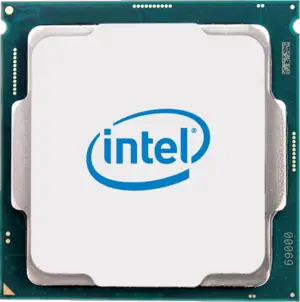 + + |
| manufacturer | Intel + |
| market segment | Desktop + |
| max cpu count | 1 + |
| max junction temperature | 373.15 K (100 °C, 212 °F, 671.67 °R) + |
| max memory | 131,072 MiB (134,217,728 KiB, 137,438,953,472 B, 128 GiB, 0.125 TiB) + |
| max memory bandwidth | 39.74 GiB/s (40,693.76 MiB/s, 42.671 GB/s, 42,670.5 MB/s, 0.0388 TiB/s, 0.0427 TB/s) + |
| max memory channels | 2 + |
| max storage temperature | 398.15 K (125 °C, 257 °F, 716.67 °R) + |
| microarchitecture | Coffee Lake + |
| min junction temperature | 273.15 K (0 °C, 32 °F, 491.67 °R) + |
| min storage temperature | 248.15 K (-25 °C, -13 °F, 446.67 °R) + |
| model number | i7-9700K + |
| name | Core i7-9700K + |
| package | FCLGA-1151 + |
| part number | BX80684I79700K +, BXC80684I79700K + and CM8068403874212 + |
| platform | Coffee Lake + |
| process | 14 nm (0.014 μm, 1.4e-5 mm) + |
| release price | $ 374.00 (€ 336.60, £ 302.94, ¥ 38,645.42) + and $ 385.00 (€ 346.50, £ 311.85, ¥ 39,782.05) + |
| release price (box) | $ 385.00 (€ 346.50, £ 311.85, ¥ 39,782.05) + |
| release price (tray) | $ 374.00 (€ 336.60, £ 302.94, ¥ 38,645.42) + |
| s-spec | SRELT + and SRG15 + |
| s-spec (qs) | QQPK + |
| series | i7-9000 + |
| smp max ways | 1 + |
| socket | LGA-1151 + |
| supported memory type | DDR4-3000 + |
| tdp | 95 W (95,000 mW, 0.127 hp, 0.095 kW) + |
| technology | CMOS + |
| thread count | 8 + |
| turbo frequency (1 core) | 4,900 MHz (4.9 GHz, 4,900,000 kHz) + |
| word size | 64 bit (8 octets, 16 nibbles) + |
| x86/has memory protection extensions | true + |
| x86/has software guard extensions | true + |
